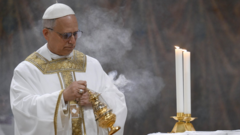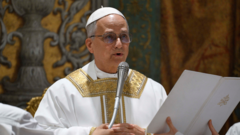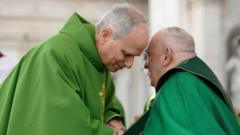Amidst calls for representation, the potential selection of an African pope reflects the changing demographics of the Catholic community.
Will Africa Finally Have a Pope? Implications of Rapid Catholic Growth

Will Africa Finally Have a Pope? Implications of Rapid Catholic Growth
As the Catholic Church experiences unprecedented growth in Africa, the possibility of electing a pope from the continent is sparking discussions among faith leaders.
6 days ago, Lebo Diseko, Global religion reporter, BBC News
If the surge in the Catholic population was the only factor determining the next pope, it would almost certainly be someone from Africa. This continent now boasts over 281 million Catholics, accounting for more than half of the Church's global growth, yet the last African pope, Gelasius I, passed away over 1,500 years ago. As the electors prepare to convene at the Vatican to select Pope Francis's successor, African clergy are increasingly visible, but questions linger about their influence.
Father Stan Chu Ilo, a Nigerian priest and academic, highlighted that while the election of an African pope would be a monumental step for the Church, the current lack of senior African clergy in the Vatican poses a challenge. Despite Pope Francis increasing the number of cardinals from sub-Saharan Africa to 12%, prominent African clerics have yet to stake a strong claim for the papacy. Figures such as Cardinal Robert Sarah of Guinea and Cardinal Fridolin Ambongo of the Democratic Republic of Congo are emerging as influential voices, while Ghanaian Cardinal Peter Turkson remains a key figure within Vatican discussions.
Pope Francis's impactful visits throughout Africa have underscored his commitment to the continent, yet some African scholars express concern over the superficial nature of considerations for an African pope. Father Paulinus Ikechukwu Odozor emphasized that the papacy should transcend issues of origin and focus principally on the theological and relational responsibilities of the pontiff.
The pontiff's role as a leader means considering global issues and promoting universal fellowship among Catholics—regardless of their location or cultural context. At the same time, some Africans feel marginalized within Church discussions, leading to calls for greater representation in leadership roles. The perspectives shared by bishops on sensitive issues like LGBTQ+ rights illustrate a significant rift, further impacting views on potential candidates from Africa.
Although the advancements made under Pope Francis's tenure show promise for African representation, underlying prejudices may create barriers to electing an African pontiff. Clergy members acknowledge that racism, often unaddressed in Church conversations, could undermine the significance of an African pope's election.
With the conclave approaching and the potential for a "poor-first" leadership style echoing Pope Francis's ethos, the outcome remains uncertain. Such developments continue to prompt discussions on the evolution of the Catholic Church.
In the wake of this significant transition, many within the Church hold onto a hopeful vision, praying for a leader equipped to meet the diverse needs of Catholics around the world, possibly from Africa—or beyond.
Ultimately, it remains to be seen if a pope from Africa will ascend to the Vatican, marking a groundbreaking moment in Church history and faith representation.
If the surge in the Catholic population was the only factor determining the next pope, it would almost certainly be someone from Africa. This continent now boasts over 281 million Catholics, accounting for more than half of the Church's global growth, yet the last African pope, Gelasius I, passed away over 1,500 years ago. As the electors prepare to convene at the Vatican to select Pope Francis's successor, African clergy are increasingly visible, but questions linger about their influence.
Father Stan Chu Ilo, a Nigerian priest and academic, highlighted that while the election of an African pope would be a monumental step for the Church, the current lack of senior African clergy in the Vatican poses a challenge. Despite Pope Francis increasing the number of cardinals from sub-Saharan Africa to 12%, prominent African clerics have yet to stake a strong claim for the papacy. Figures such as Cardinal Robert Sarah of Guinea and Cardinal Fridolin Ambongo of the Democratic Republic of Congo are emerging as influential voices, while Ghanaian Cardinal Peter Turkson remains a key figure within Vatican discussions.
Pope Francis's impactful visits throughout Africa have underscored his commitment to the continent, yet some African scholars express concern over the superficial nature of considerations for an African pope. Father Paulinus Ikechukwu Odozor emphasized that the papacy should transcend issues of origin and focus principally on the theological and relational responsibilities of the pontiff.
The pontiff's role as a leader means considering global issues and promoting universal fellowship among Catholics—regardless of their location or cultural context. At the same time, some Africans feel marginalized within Church discussions, leading to calls for greater representation in leadership roles. The perspectives shared by bishops on sensitive issues like LGBTQ+ rights illustrate a significant rift, further impacting views on potential candidates from Africa.
Although the advancements made under Pope Francis's tenure show promise for African representation, underlying prejudices may create barriers to electing an African pontiff. Clergy members acknowledge that racism, often unaddressed in Church conversations, could undermine the significance of an African pope's election.
With the conclave approaching and the potential for a "poor-first" leadership style echoing Pope Francis's ethos, the outcome remains uncertain. Such developments continue to prompt discussions on the evolution of the Catholic Church.
In the wake of this significant transition, many within the Church hold onto a hopeful vision, praying for a leader equipped to meet the diverse needs of Catholics around the world, possibly from Africa—or beyond.
Ultimately, it remains to be seen if a pope from Africa will ascend to the Vatican, marking a groundbreaking moment in Church history and faith representation.






















